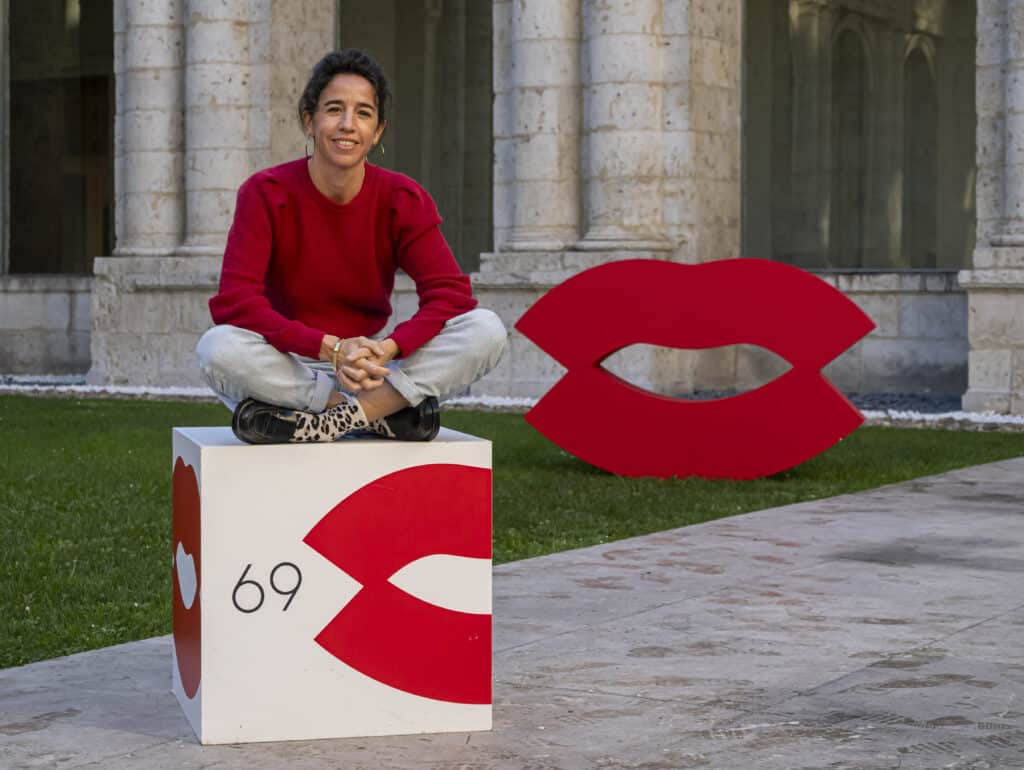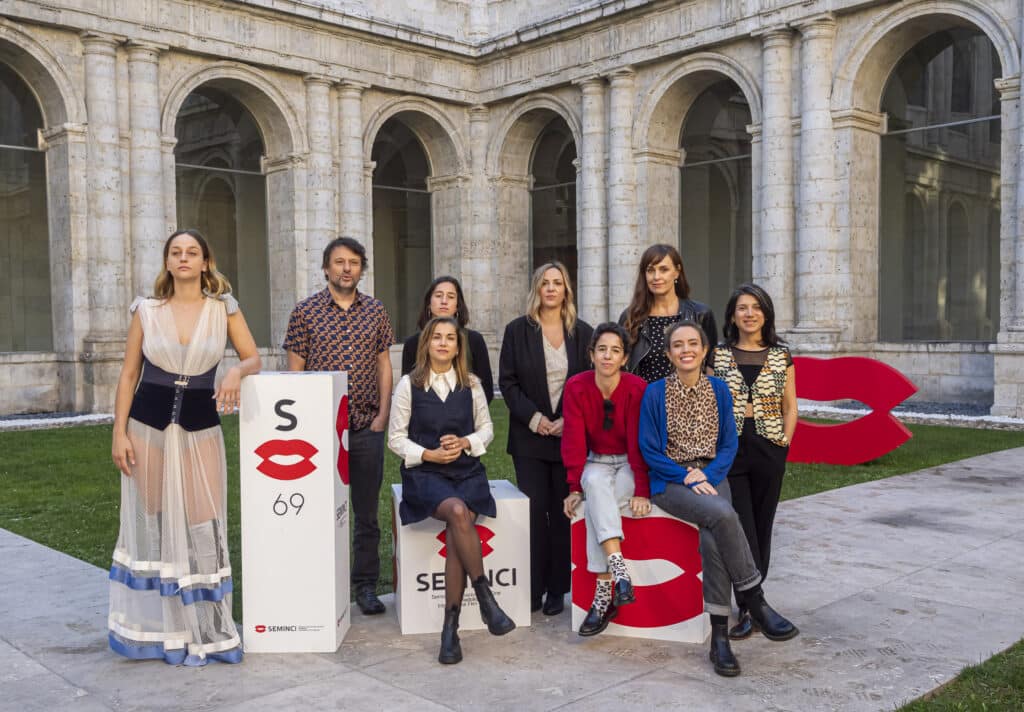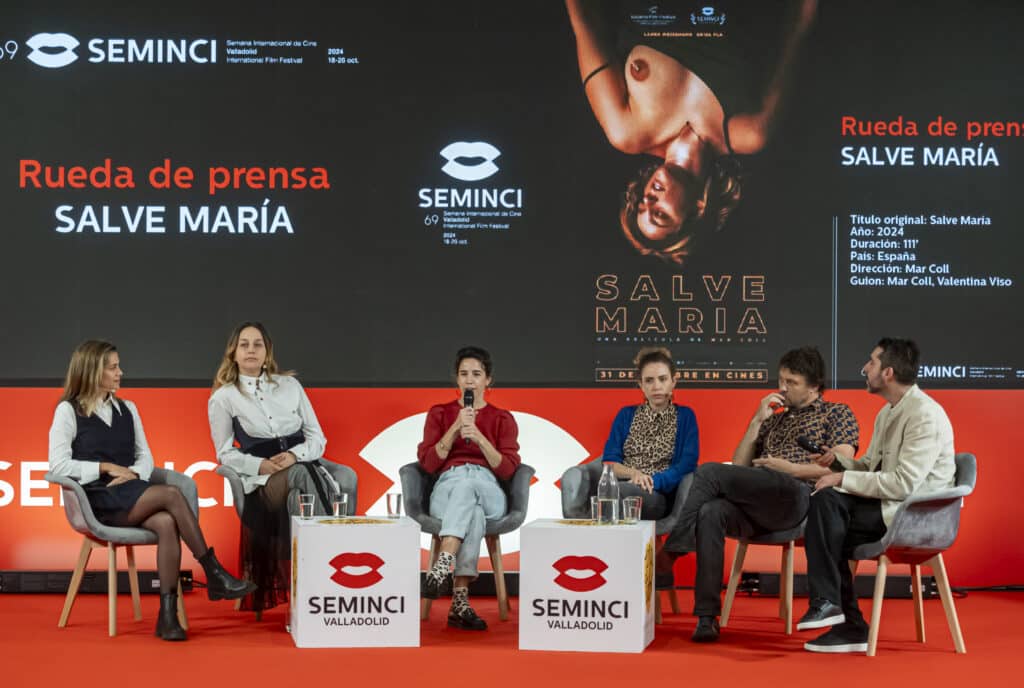- In ‘Salve María’, which competes for the Golden Spike at the 69th SEMINCI, Mar Coll plays with the codes of genre cinema to give shape to a dark and honest story about the stage after childbirth, with the shadow of infanticide.

Valladolid, 24 October 2024. The director Mar Coll has presented the national premiere of her third feature film, Salve María, in competition in the Official Section, at the 69th Valladolid International Film Festival. The film, which won an award at the Locarno Festival, marks Mar Coll’s return to SEMINCI, which opened its 58th edition with her previous feature, Todos queremos lo mejor para ella. It is an uncompromising story about ambivalent feelings and emotions towards motherhood, starring Laura Weissmahr and Oriol Pla.
The news of an infanticide, committed by a distant acquaintance, upsets María, a young journalist who is living her recent maternity marked by exhaustion and the anguish of not being up to the task, to the limits of obsession. With this premise, which is based on the novel Las madres no, by Katixa Agirre, Coll looks into the dark abyss that the experience of puerperal motherhood can mean, taking it to a disturbing territory that plays with the codes of dramatic thriller and horror.

Dark Maternities
Salve María is the third collaboration between Coll and screenwriter Valentina Viso. ‘We started the process together, asking ourselves what we could do that would motivate us both. At the time I had a baby less than a year old and Valentina had already been a mother for years. So we started to explore the subject,’ the director acknowledged. ‘All this coincided with the fact that I read Katixa’s novel and it had a great impact on me precisely because I was going through that process. And with Valentina, we thought it was a good idea to tackle an adaptation, which allowed us a different process to the one we had done until now’.
For her part, Viso shared that they wanted to avoid self-fiction; to talk about motherhood, but not from their own experience. To which Coll added: ‘We wanted to move away from intimate and realistic cinema. We were motivated by the idea of making something that tended towards genre and making a very expressive film. We wanted to tell the story of motherhood in a more visceral way, that it was something that would be close to the protagonist’s experience’.
The challenge of playing this mother in conflict has fallen to Laura Weissmahr, who has lived the experience of her character as her own: ‘It was a great challenge, because I am not a mother and at the beginning I felt like an impostor. We rehearsed with Mar for almost three months and I did a whole rational construction of the character, researching and reading. But when we started shooting, I realised that it was much more intuitive and emotional, to stand in the present with the baby and take it all into my own darkness. I was feeling what my character was feeling, I was afraid of hurting the baby, it was all very real’. And she added: ‘I think Mar has achieved something very beautiful and that is that as a spectator you make the journey with the character. The same thing happened to me as an actress’.

Putting it into words
On the adaptation of Katixa Agirre’s novel, Coll commented that the writing process was very long. ‘The novel mixes different genres, it has that part of thriller, but also of essay and journalistic chronicle. At the beginning, the film was going to be about motherhood and writing, but little by little we moved away from that more intellectual starting point and moved towards emotion. Although that other layer is there, the main conflict of the protagonist, the rejection she feels towards her baby, is something we contributed’.
Following this line, Viso pointed out: ‘We had to turn the order of what came before and after. Because we had the shadow of infanticide, a tormented mother and a baby. And what traps you is that latent threat throughout the film. That’s when we knew that the reflections of discourse had to take a back seat.
Coll has also emphasised the importance of words for her main character: ‘The protagonist’s arc has to do with the impossibility of naming and putting into words what is happening to her. There is a stigma with these maternities that are outside the mainstream narrative. And the detachment that Maria feels is so great and strong that she is unable to admit it, even to herself. It is an inability that comes from guilt, and we wanted to show her journey towards being able to say and express what she feels’.
The producer María Zamora, recent winner of the National Film Award, agreed that this is a taboo subject that is rarely talked about. ‘It is true that in recent years cinema and literature have done more about it, but it has to continue to be done. Between the repentant and the unrepentant mother, there are a lot of greys, and I think that many people will identify with this film’.

Press contact:
983 42 64 60
prensa@seminci.com



























![Logo Foro Cultural de Austria Madrid[1]](https://www.seminci.com/wp-content/uploads/2024/09/Logo-Foro-Cultural-de-Austria-Madrid1-300x76.jpg)








